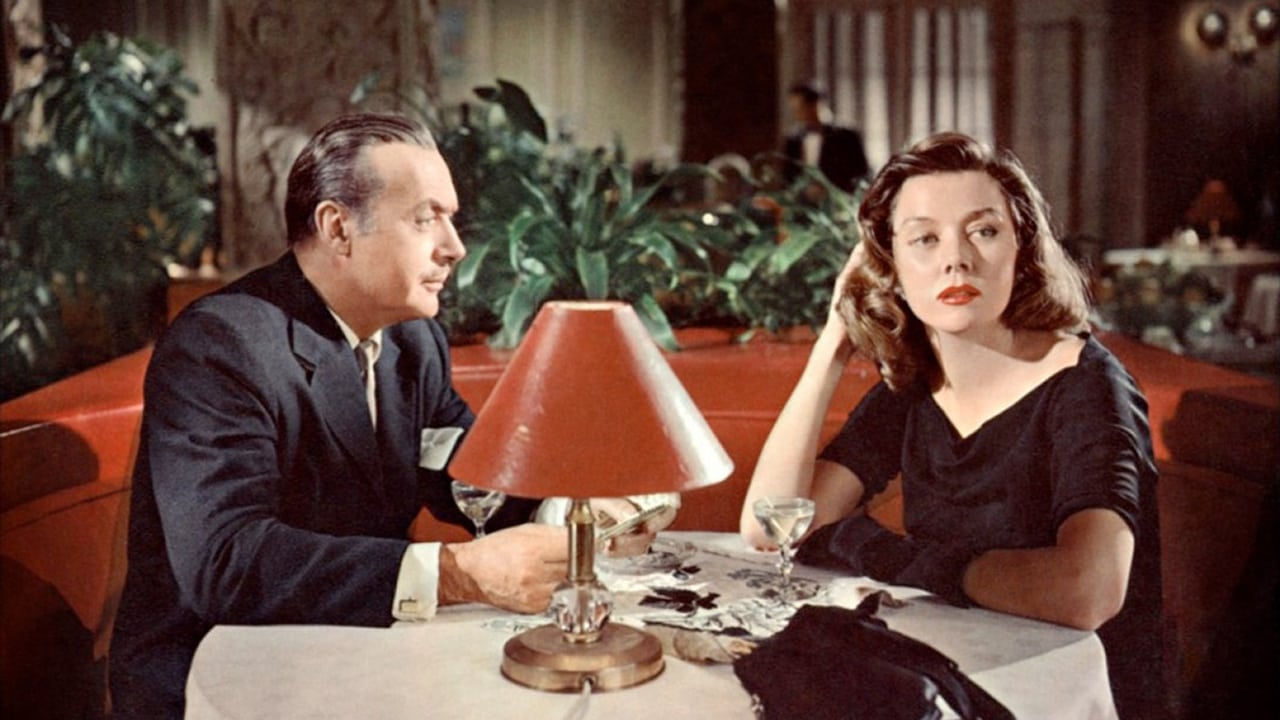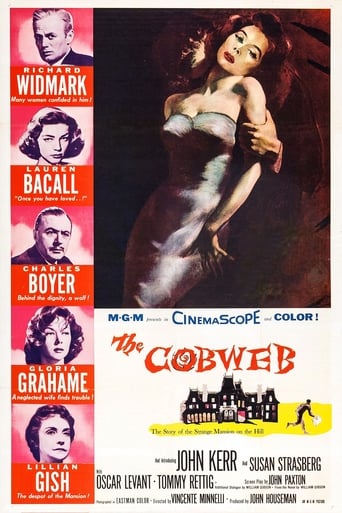

Too many fans seem to be blown away
... View MoreThat was an excellent one.
... View MorePurely Joyful Movie!
... View MoreIt’s an especially fun movie from a director and cast who are clearly having a good time allowing themselves to let loose.
... View MoreInteresting and Odd, this Movie is Much More than it Seems at First Glance. It is Rich with that 1950's Take on Psychotherapy and Plays it Very Serious but the Heavy Subject Matter Is Sidetracked, at Least on the Surface, with Much Ado About Nothing. The Drapes.It Can be Insightful at Times and is Ripe for the Picking it Apart Crowd that are Not Willing or Able to Read Between the Lines. It is a Product of its Time to be Sure, what with the Cinemascope and Mega-Cast of Big Stars, and it does Come Across Today as a bit Hokey and Melodramatic, but there is Some Vintage Gold to be Mined from this Film that Got the Shaft, both Critically and Financially.Some Good Performances from All Involved with Richard Widmark Trying to Steady the Rocking Boat Full of Passengers, both Patients and Staff, that are All Different Degrees of Neurotics. Gloria Grahame is Still Beautiful and Throaty, Lillian Gish Makes a Solid Comeback, and Lauren Bacall is a Pleasantry Among the Psychically Scarred.The Direction is Hampered by the Expectations of the 1950's, Cinemascope, and a Heavy Handed Score, but Vincente Minnelli Manages to Simmer this Heated Stuff with a Light Touch of Irony and a Heavy Dose of Professional Acting.Note...This Movie has gained some Retro interest among Film Buffs Today, and it has a Great closing line from "Stevie".
... View MoreAs the great satirist Tom Leher once observed, "If people can't communicate then the very least that they should do is to shut up". "The Cobweb" is a perfect case in point. There's a tremendous amount of talk in this movie, but almost no communication. The plot revolves around the selection of new drapes for the library in a psychiatric hospital. However, it's the lack of communication in regard to that issue, and the complications ensuing therefrom, that form the crux of the story. Along the way it becomes clear that the staff are not all that much more well-adjusted than the inmates. They display a great deal of professional and personal jealousy, insecurity and frustration. But then, as the frustrated head of the Bullock household wisely observed in the classic screwball comedy film, "My Man Godfrey", "All you need to start an asylum is an empty room and the right kind of people." There are plenty of the right kind of people in "The Cobweb", among both the staff and the inmates.Directed by Vincent Minelli and featuring a first-rate cast (including one of the great stars of silent films, Lillian Gish), "The Cobweb" had all the elements to have become a really great movie. Nevertheless, somehow, it doesn't quite come off. Perhaps it's because the film is a little bit too talky. Perhaps the issue of which drapes to hang in the sanatorium library is a bit too minor and superficial to excite the viewer's attention. Nevertheless, if you haven't seen this one, give it a chance, it might just grab you.
... View MoreVery disappointing film with Charles Boyer terribly miscast as a therapist in an institution who has lost his self-respect.We know that there are debates regarding how much autonomy patients should have in these places. The main thrust of the film is about hanging up draperies. I haven't heard that term since the woman portraying Mamie Eisenhower in the fabulous "Backstairs at The White House" correcting the maid for using the term drapes instead of draperies.Richard Widmark, as the other therapist, is good here but the material, excuse the pun, does him in as well in a poor script. Gloria Grahame, as his frustrated, neglected wife, is also good.The film does show that both therapists need help for their own problems. The real star here is Lillian Gish, as the neglected, devoted worker trying her very best to assert herself. Gish portrays an anxious spinster who is really unable to cope.This is certainly not "One Flew Over the Cuckoo's Nest."
... View MoreThere is an element of escapism in Minnelli's penchant for melodrama, and joy is the voice of the escaped psyche, but he hasn't quite released himself from his frustrations with reality, as they are all over his melodramas, disparaged by the atonal brasses from composer Leonard Rosenman. Like Minnelli's Hollywood melodrama The Bad and the Beautiful, his 1955 film The Cobweb depicts the indoor routine of a secluse, insulated group of people, and like the former, it focuses on professional careers atoning for emotional hang-ups, particularly isolated, disheartened home lives. In a sense, the film follows the quest for the perfect family. The film's effect relies on the acute lucidity with which the audience can relate to the characters. The Cobweb becomes a personal film for Minnelli in more manners than one.The psychiatric environment embodies a disparaging enthrallment for Minnelli, after years of shepherding Judy through myriad institutions. The curious scenario, and some of the characters, strike a unity, playing to the inner pretentious aesthete in us all. The animosity between the clinic's patients and the bickering personnel detonates over a presumably frivolous decorative issue, the choice of new drapes for the lounge. Though for an epicure like Minnelli, the matter is invariably not frivolous but crucial. Furnishings express not only ornamental but more deep-seated conscientious matters as well.Richard Widmark plays a clinical psychiatrist stuck between his household family of his wife Karen and their two children, and the makeshift family that he propagates in his clinic with self-motivated staff worker Lauren Bacall, and agitated teenage artisan John Kerr. Widmark and Bacall ask Kerr to create new drapes for the clinic's library as a healing activity, not knowing that Gloria Grahame, Widmark's frustrated wife, and a stately administrator at the clinic played with bureaucratic bustle by Lilian Gish, have already taken charge of doing it. This unfolding intrigue conveys considerable labyrinthine kindred, civil, and administrative warfare. Reproach flourishes in the forms of the artist as refugee, profession as rectification for private disenchantment, the grind between cultivating one's identity at the cost of solitude and the compulsion to follow and synthesize into a comprehensive society.The clinic on screen doesn't parallel any specific or incidentally real institution. The group scenes play out like Minnelli's usual party scenes, a neurotic congregation of loose-lipped free-thinkers and recoiling self-observers, boldly highlighted by Charles Boyer's admirably self-effacing performance. He is an actor utterly sure of himself and needs no abstract means of support. And no matter how many times one has heard thoughts expressed by however many people, Lauren Bacall always makes them sound original. Thus The Cobweb is not impaired by a lack of realism but embellished by a uniquely expressionistic blend of tones.The movie's household scenes are more horrific than those at the clinic. Many couples will identify strongly with the arguments between Grahame, who believes her husband is implying malicious affronts, and Widmark, who never says anything to his wife that means anything but exactly what he's saying. Widmark is not giving a wooden portrayal of a sensitive man but a sensitive portrayal of a man who is not bothered by much. Conversely, Grahame famously said, "It's not how I looked at a man; it was the thought behind it." I believe her, because she plays Widmark's wife as someone unhappy with who she is and what she has because her mind is scattered and she is not content with thinking.It's a nugget of blackly hilarious, embroidered reality that indicates the immediate misanthropy about family life in the flush 1950s, and how many American marriages persist in self-insulated conditions to this day with similar results. Note this bit between a patient and his psychiatrist: "Your'e supposed to be making me fit for normal life. What's normal? Yours? If its a question of values, your values stink. Lousy, middle-class, well-fed smug existence. All you care about is a paycheck you didn't earn and a beautiful thing to go home to every night." Or the fleeting brush between Grahame and Kerr, in which they consider the connotations of flowers.
... View More